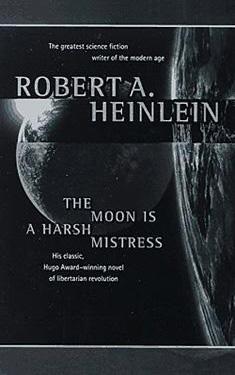Robert A. Heinlein
Completed and reviewed on 4/13/2012, revised 10/8/2013
4 stars
 Because of my experiences with Heinlein’s previous two
winners, Starship Troopers and Stranger in a Strange Land, I began reading this
book with some trepidation. To compound
matters, I realized that the narrator, Mannie, spoke with what seemed to me to
be a Russian accent, despite his Hispanic sounding name. For the first 150 pages, I couldn't read
without hearing the accent of Andre Codrescu, from NPR. Though not Russian, Codrescu’s accent was
sufficiently Slavic to match my perception of the accented writing. Those first 150 pages were slow reading
because of this Codrescu filter in my head.
Once I got into the rhythm of the language, I was able read much more
quickly.
Because of my experiences with Heinlein’s previous two
winners, Starship Troopers and Stranger in a Strange Land, I began reading this
book with some trepidation. To compound
matters, I realized that the narrator, Mannie, spoke with what seemed to me to
be a Russian accent, despite his Hispanic sounding name. For the first 150 pages, I couldn't read
without hearing the accent of Andre Codrescu, from NPR. Though not Russian, Codrescu’s accent was
sufficiently Slavic to match my perception of the accented writing. Those first 150 pages were slow reading
because of this Codrescu filter in my head.
Once I got into the rhythm of the language, I was able read much more
quickly.
At one point, in the first 100 or so pages, I couldn't
understand how the book could be so long.
I felt that once again, this book was a merely a collection of essays of
Heinlein’s political and sociological beliefs.
It felt like this was filler and rehashing of previously espoused libertarianism,
militarism, and free love. Eventually I eased into the text with a little more
patience. I realized it read much more
naturally than the posturing he did in the other two books. I went from being
annoyed at the politics, to being totally enrapt by the descriptions of the
society.
I’m also impressed by this book because it is the first war
novel I’ve enjoyed. The Forever War was
very good, but I didn’t care for either Starship Troopers or Forever
Peace. I often find it difficult to
follow the action in war novels. “Moon,”
however, grabbed me at a much baser level.
The idea of revolution must have connected with my sense of one of the
problems in the US today, specifically, politics dictated and manipulated by
corporations. So when the novel finally
got to the active war of independence, I was consumed by the details.
I loved the main characters.
Mike, the computer that gains sentience, was particularly fun. I found it refreshing that Mike had a sense
of humor and loved jokes. The character
of Mike made me reflect on the history of AI in SF. Reading this, I couldn't help but think of
computers gone crazy, like HAL from 2001: A Space Odyssey, or Colossus of
“Colossus: The Forbin Project.” Was the
theme of AI gone bad a more common theme than benevolence? Having HAL deeply ingrained in my psyche made
me more appreciative of Mike and his relationship to Mannie and the revolution.
My biggest beef with the book was the character
Wyoming. Once again, a female character
is introduced with some flourish. She
starts as a strong woman, a leader in the fight for revolution. But quickly, she falls to the sidelines and
becomes a supporting wife-type character.
Granted, this book was written in 1966, so I give it some leeway in that
it was the product of a man with very archaic views of women’s roles, even within
his polyamorous philosophy. Nonetheless,
she is so relegated to the sidelines, that towards the end, she only makes
appearances to serve coffee, or help the main character to bed. There is some redemption, however, in the
matriarchal/polyandrous structure of the families on the Moon.
Overall, I give this book 4 stars despite the sexism. I was drawn into the society and
conflict. I also found the shaky
formation of the government to be very believable and human. Out of the four Heinlein books I’ve read so
far, I have to say this is my favorite.
No comments:
Post a Comment